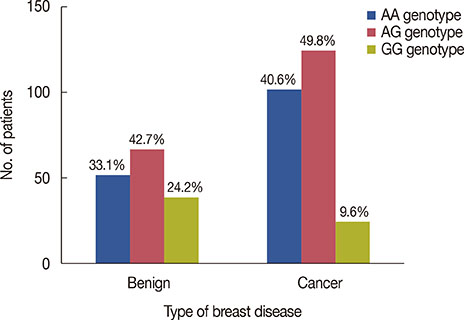J Breast Cancer.
2016 Jun;19(2):206-209. 10.4048/jbc.2016.19.2.206.
Mu-Opioid Receptor Polymorphisms and Breast Cancer in a Korean Female Adult Population: A Retrospective Study
- Affiliations
-
- 1Department of Anesthesiology and Pain Medicine, Konkuk University Medical Center, Konkuk University School of Medicine, Seoul, Korea. yshkim75@daum.net
- 2Department of Microbiology, Konkuk University School of Medicine, Seoul, Korea.
- 3Department of Surgery, Konkuk University Medical Center, Konkuk University School of Medicine, Seoul, Korea.
- 4Institute of Biomedical Science and Technology, Konkuk University School of Medicine, Seoul, Korea.
- KMID: 2308973
- DOI: http://doi.org/10.4048/jbc.2016.19.2.206
Abstract
- Distribution of A118G single nucleotide polymorphism (SNP) in the mu-opioid receptor 1 gene (OPRM1) differs with ethnicity. We assessed the distribution of this SNP in Korean women with breast cancer and compared it with that in women of other ethnicities with breast cancer. Distribution of SNP genotypes was as follows: 49.8% for AG genotype, 40.6% for AA genotype, and 9.6% for GG genotype. Logistic regression analysis showed a negative association between the presence of the G allele at position 118 of OPRM1 and breast cancer in the studied population (odds ratios [OR], 0.635; p=0.002). However, the AG and GG genotypes were not associated with breast cancer in the studied population (OR, 0.719; p=0.130). The proportions of the AG and GG genotypes of the OPRM1 SNP were higher in Korean women with breast cancer than in those of other ethnicities.
MeSH Terms
Figure
Reference
-
1. Afsharimani B, Cabot P, Parat MO. Morphine and tumor growth and metastasis. Cancer Metastasis Rev. 2011; 30:225–238.
Article2. Gach K, Wyrębska A, Fichna J, Janecka A. The role of morphine in regulation of cancer cell growth. Naunyn Schmiedebergs Arch Pharmacol. 2011; 384:221–230.
Article3. Mathew B, Lennon FE, Siegler J, Mirzapoiazova T, Mambetsariev N, Sammani S, et al. The novel role of the mu opioid receptor in lung cancer progression: a laboratory investigation. Anesth Analg. 2011; 112:558–567.4. Cieślińska A, Sienkiewicz-Szłapka E, Kostyra E, Fiedorowicz E, Snarska J, Wroński K, et al. Mu opioid receptor gene (OPRM1) polymorphism in patients with breast cancer. Tumour Biol. 2015; 36:4655–4660.5. Lee SH, Kim JD, Park SA, Oh CS, Kim SH. Effects of micro-opioid receptor gene polymorphism on postoperative nausea and vomiting in patients undergoing general anesthesia with remifentanil: double blinded randomized trial. J Korean Med Sci. 2015; 30:651–657.
Article6. Zhang W, Yuan JJ, Kan QC, Zhang LR, Chang YZ, Wang ZY. Study of the OPRM1A118G genetic polymorphism associated with postoperative nausea and vomiting induced by fentanyl intravenous analgesia. Minerva Anestesiol. 2011; 77:33–39.7. Sia AT, Lim Y, Lim EC, Goh RW, Law HY, Landau R, et al. A118G single nucleotide polymorphism of human mu-opioid receptor gene influences pain perception and patient-controlled intravenous morphine consumption after intrathecal morphine for postcesarean analgesia. Anesthesiology. 2008; 109:520–526.
Article8. Bortsov AV, Millikan RC, Belfer I, Boortz-Marx RL, Arora H, McLean SA. Mu-opioid receptor gene A118G polymorphism predicts survival in patients with breast cancer. Anesthesiology. 2012; 116:896–902.
Article9. Wang Q, Gu D, Wang M, Zhang Z, Tang J, Chen J. The E-cadherin (CDH1) -160C>A polymorphism associated with gastric cancer among Asians but not Europeans. DNA Cell Biol. 2011; 30:395–400.
Article10. He BS, Pan YQ, Zhang Y, Xu YQ, Wang SK. Effect of LEPR Gln223Arg polymorphism on breast cancer risk in different ethnic populations: a meta-analysis. Mol Biol Rep. 2012; 39:3117–3122.
Article11. Marshall LM, Hunter DJ, Connolly JL, Schnitt SJ, Byrne C, London SJ, et al. Risk of breast cancer associated with atypical hyperplasia of lobular and ductal types. Cancer Epidemiol Biomarkers Prev. 1997; 6:297–301.
- Full Text Links
- Actions
-
Cited
- CITED
-
- Close
- Share
- Similar articles
-
- Vitamin D receptor gene polymorphisms in breast cancer
- Successful Treatment with Transdermal Buprenorphine Patch in Opioid-Dependent Cancer Patients: Case Series
- The effects of nalbuphine and fentanyl on experimental spinal cord injuries
- Can oliceridine (TRV130), an ideal novel µ receptor G protein pathway selective (µ-GPS) modulator, provide analgesia without opioid-related adverse reactions?
- The Effects of Peripheral mu and kappa Opioid Receptor Agonists on the Thermal Injury Induced Hyperalgesia in the Rat


